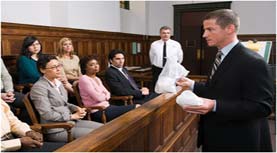
The responsibilities of an attorney cover many areas, described in very general terms below:
Oral Arguments in Courts
One primary function of an attorney is to argue a client's case before a judge or jury in a court of law. Although clients may choose to represent themselves, being represented by an attorney familiar with the court's procedures makes the legal system more efficient for everyone involved.
Researching and Drafting of Court Papers
Often, attorneys brief the court in writing on the issues of a case before they're orally argued. They may have to perform research into pertinent facts and applicable law while drafting legal papers and preparing for oral argument.
Client Intake and Counseling
One important part of an attorney's job is developing and managing relationships with clients. The client-lawyer relationship usually begins with an intake interview. At this time the lawyer gets to know the client personally, discovers the facts of the case, clarifies the client's goals, shapes their expectations, begins to formulate potential claims or defenses, and explains her or his fees to the client.
Legal Advice
Legal advice is the application of the principles of the law to the facts of a client's case in order to advise them about what they should do next. In the United States, only a licensed lawyer may provide legal advice to clients for consideration, even if no lawsuit is being considered or is in progress
Protecting Intellectual Property
In the United States, patents, trademarks, industrial designs, and other forms of intellectual property are registered with the appropriate agency in order to receive maximum protection under the law. Attorneys who specialize in patent and trademark law are usually uniquely trained and experienced.
Carrying Out the Intent of the Deceased
In the United States, a court through probate administers the estates of the deceased. American attorneys have a veritable monopoly on dispensing advice regarding probate law. A significant number of attorneys specialize in this complicated area of legal practice.
Prosecution and Defense of Criminal Suspects
Prosecutors are usually attorneys who hold regular licenses and happen to work for the government office that files criminal charges against suspects. Criminal defense lawyers specialize in the defense of those charged with crimes.
Note that in the United States law is primarily taught at law schools. These schools are graduate/professional schools where a bachelor's degree is a prerequisite for admission. Most law schools are part of universities, though a few are independent institutions. Law schools in the United States offer graduating students a J.D. (Juris Doctor/Doctor of Jurisprudence) as the practitioner's law degree. All legally licensed attorneys in the United States must have a law degree.
- See Top 10 Reasons Most Law Firms Have No Idea How to Hire and Evaluate Patent Attorneys for more information.



